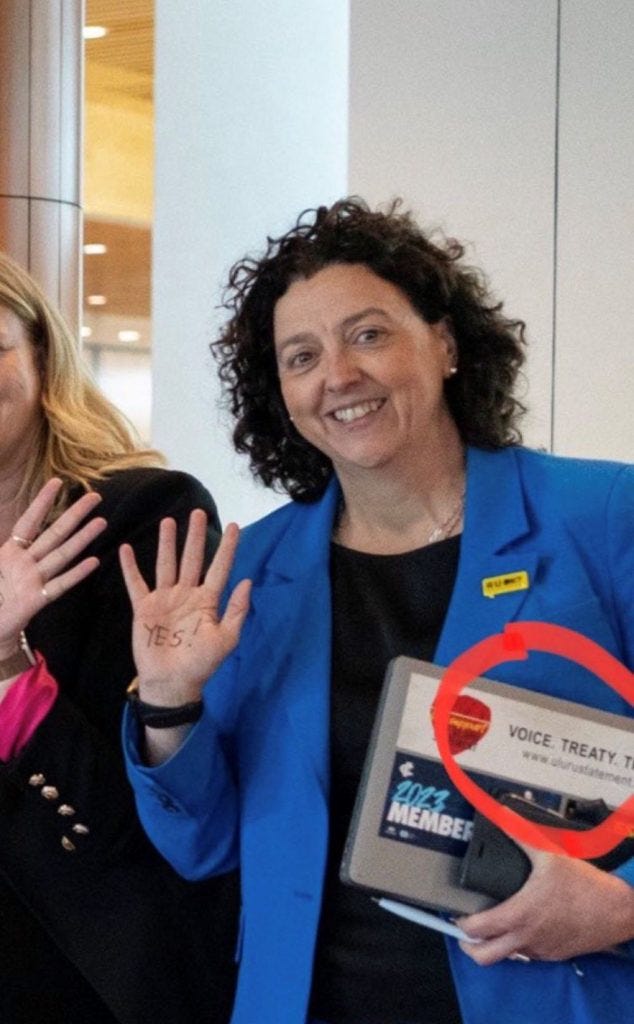
5 Dangerous Blind-Spots In ‘Yes’ Arguments (Part 3)
“We must face the fact that the preservation of individual freedom is incompatible with a full satisfaction of our views of distributive justice.”
F.A. Hayek
Let’s recap.
In 5 Dangerous Blind-Spots In ‘Yes’ Arguments (Part 1), I addressed Duncan’s self-described ‘indifference’ to the Voice as an issue and that the ‘Yes’ case really acquiesces to systemic racism.
This is:
Blind-Spot #1: Systemic Racism
In 5 Dangerous Blind-Spots In ‘Yes’ Arguments’ (Part 2), I then tackled his leading two arguments, exposing the flaws in each:
Blind-Spot #2: Can’t Get Much Worse
Blind-Spot #3: Concede or Else
This is the third and final instalment, in which I’ll conclude with two more blind-spots which, I suggest, no libertarian would accept:
Blind-Spot #4: Bureaucratic Expansion
Blind-Spot #5: Government Is Harmless.
*****
BLIND-SPOT #4: BUREAUCRATIC EXPANSION
If the former Senator had diverted us from the libertarian freeway by this point, he next drives us into a philosophical traffic-jam with “The passing of the referendum would require the indigenous bureaucracy to be reshaped, and would likely increase it in the short term.”
Not likely. Definitely. Not short-term. Long-term.
Consider the half century bureaucratic history just on this issue alone:
1967 – Council of Aboriginal Affairs
1972 – National Aboriginal Consultative Committee
1973 – Department of Aboriginal Affairs
1977 – National Aboriginal Conference
1981 – Aboriginal Development Committee
1988 – Mabo (No. 2)
1990 – ATSIC
1991 – Council for Aboriginal Reconciliation
1992 – Wik case
1993 – Native Title Act
He’d have you believe a politically-charged, constitutionally-enshrined Voice would be ignored
1995 – National Inquiry into the Separation of the Aboriginal and Torres Strait Islanders Children
1999 – Preamble Referendum
2006 – Reconciliation Action Plan
2008 – National Apology to Stolen Generation
2010 – National Congress of Australia’s First Peoples, Expert Panel on Constitutional Reconciliation
2012 – Joint Select Committee on Constitutional Recognition of Aboriginal & Torres Strait Island People
2013 – Aboriginal and Torres Strait Island People Recognition Act
2014 – Act of Recognition Review Panel
2015 – Referendum Council
2017 – Uluru Statement From The Heart calling for Voice, Treaty and Reparations
2023 – Voice Referendum
It’s a novel argument. I’ve never heard of a libertarian accepting an increase in the size of bureaucracy, short or long term.
My simple fig farmer mind is more attracted to the libertarian satirist, P.J. O’Rourke, who wrote:
“The growth of government is like the spread of a dense jungle, and the average citizen can hack through less of it every year.”
I’m still grappling with NDIS budgets growing from $4 billion in 2016 to $49 billion in 2023. I’m imagining that’s what the Voice will be, plus of course the $450 million just to run this Referendum!
Further, what the former Senator dismisses as a ‘slippery slope’ argument in the next step to Aboriginal treaties is a stated ambition in the Uluru Statement From The Heart.
I suspect he believes No campers are jumping at conspiracy shadows. You know, if our opponents write a 26-page mission statement called the Uluru Statement and conduct national roadshows talking about their plans for treaties, I listen.
And, ignoring this, if we do have a Voice, what would the logical argument from the former Senator be then: ‘They’re jumping at conspiracy shadows with reparations. Vote ‘yes’ to treaties.’
Step by methodical step, we move in the wrong direction towards an expanding bureaucracy.
*****
BLIND-SPOT #5: GOVERNMENT IS HARMLESS
Then there are the worrying one-line snippets which suggest very little by way of libertarian thinking, all downplaying the impact government has. In his language, he implies government is somehow harmless or innocuous.
In one example, the former Senator says the Voice will have “little bearing on lives of individuals”.
Then why push it? Libertarians are pro individual. Let’s not push the collective.
The former Senator blithely continues, “the passing of the referendum would do nothing to reduce the existing ability of anyone to make representations.”
I’d turn that line back on the good Senator as an argument against the Voice. If the Voice does nothing to reduce existing abilities to make representations, great. Let’s keep that benefit without yet another bureaucratic expansion.
I’ve never heard of a libertarian accepting an increase in the size of bureaucracy
He rails against “arguments against a body whose advice needs to be waited for and listened to, when no such body is being proposed”. Oh, it won’t be listened to? Why have it then?
Further, he’d have you believe a politically-charged, constitutionally-enshrined Voice would be ignored. Come on. Look at the oxygen it’s already sucking from the public square. Look at the money suck over the last 50 years.
*****
There are other points to raise, but I suggest this is enough to dispatch the Yes case.
Five blind-spots in the ‘yes’ camp arguments:
Blind-Spot #4: Bureaucratic Expansion
Blind-Spot #5: Government Is Harmless.
Let me know in the comments whether you agree or disagree.
And finally, I want absolutely nothing in my response to the former Senator to suggest disrespect. He is an honourable man. Rather, I began this three-part response quoting John Milton, so I’d like to conclude with what he wrote on the importance of playing the ball not the man:
“ … to dwell at large upon the arguments, and to insist upon the reasons, and not to insult or domineer”
John Milton
The post 5 Dangerous Blind-Spots In ‘Yes’ Arguments (Part 3) appeared first on Liberty Itch.






